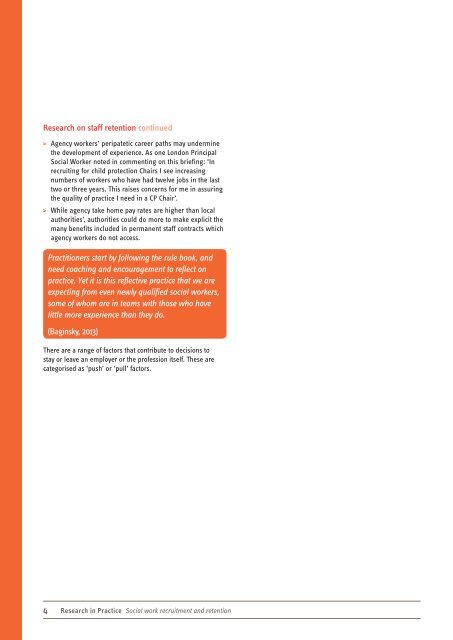Social work recruitment and retention
RiP_Strategic_Briefing_social_work_retention_web
RiP_Strategic_Briefing_social_work_retention_web
You also want an ePaper? Increase the reach of your titles
YUMPU automatically turns print PDFs into web optimized ePapers that Google loves.
Research on staff <strong>retention</strong> continued<br />
Agency <strong>work</strong>ers’ peripatetic career paths may undermine<br />
the development of experience. As one London Principal<br />
<strong>Social</strong> Worker noted in commenting on this briefing: ‘In<br />
recruiting for child protection Chairs I see increasing<br />
numbers of <strong>work</strong>ers who have had twelve jobs in the last<br />
two or three years. This raises concerns for me in assuring<br />
the quality of practice I need in a CP Chair’.<br />
While agency take home pay rates are higher than local<br />
authorities’, authorities could do more to make explicit the<br />
many benefits included in permanent staff contracts which<br />
agency <strong>work</strong>ers do not access.<br />
Practitioners start by following the rule book, <strong>and</strong><br />
need coaching <strong>and</strong> encouragement to reflect on<br />
practice. Yet it is this reflective practice that we are<br />
expecting from even newly qualified social <strong>work</strong>ers,<br />
some of whom are in teams with those who have<br />
little more experience than they do.<br />
(Baginsky, 2013)<br />
There are a range of factors that contribute to decisions to<br />
stay or leave an employer or the profession itself. These are<br />
categorised as ‘push’ or ‘pull’ factors.<br />
4 Research in Practice <strong>Social</strong> <strong>work</strong> <strong>recruitment</strong> <strong>and</strong> <strong>retention</strong>


